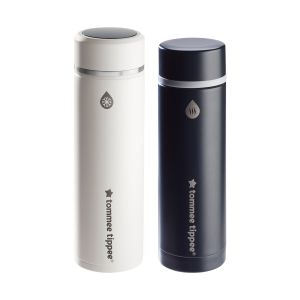
This is a demo store. No orders will be fulfilled.
Subscription orders can be cancelled at anytime. Free delivery on all subsequent subscription orders. Find out more about subscriptions.
They’re easy and fuss free
Your products are automatically sent to you
You save up to 10% when you sign up for a subscription
You can cancel at any time
Early pregnancy is an exciting time for any parent-to-be, and it���s also a crucial time for the development of the foetus. It���s during the first trimester that pregnant people often encounter some of the most challenging pregnancy symptoms.
We've written this guide to talk you through the first trimester of pregnancy. In it, we'll discover what symptoms are common, cover some top tips, and answer some of the most-asked questions about early pregnancy.
The first trimester starts on the first day of the last period and goes up to the last day of the 12th week of pregnancy. This period of pregnancy sees foetal development start with the egg being fertilised and ends when the foetus has all its organs, and its body systems are developing.
There are three trimesters that make up a pregnancy. After the first trimester, you move into the second trimester, then the third trimester.
During the first trimester of pregnancy, many changes occur. And although every pregnancy is different, many people experience the same symptoms that're often caused by changing hormones. Common first-trimester pregnancy symptoms include:
Although you'll experience lots of physical symptoms and changes in the first trimester, you might not notice a baby bump developing until around week 10.
It's important to remember that each pregnancy is unique. While some people may see a visible pregnancy bump by the end of their first trimester, others may not. It just depends on your body and your baby's development.
During the first trimester, a baby grows very quickly and how much they develop in just a few short months is incredible.
In just a few weeks, the embryo transforms into a foetus, and major organs and body systems begin to form. By the end of the first trimester, the foetus is about the size of a peach, and all major organs and body systems are in place, although they'll continue to mature throughout the rest of the pregnancy.
Although some of the symptoms you experience during the first trimester can be unpleasant, a lot of the common symptoms of early pregnancy that we���ve mentioned above are totally normal. They���re actually signs that your first trimester is going well.
On the other hand, you may feel great and not experience these common first-trimester symptoms.
If your medical appointments confirm that everything is normal with the pregnancy, then there���s no need to worry.
Some symptoms can sometimes be warning signs during pregnancy, and you should seek medical advice if you experience any of the following:
As we've covered, the first trimester is an exciting time, but it can bring some challenges that may leave you feeling tired. So, it���s important to prioritise self-care and do what feels best for you and your growing baby.
These appointments with your GP, midwife or obstetrician are really important. They allow them to check on the health of you and your baby, give you useful information, and answer any questions you may have along the way.
Once you find out that you're pregnant, you should take 400 micrograms of folic acid every day until the 12th week of your pregnancy. You should also take a 10-microgram vitamin D supplement once a day throughout your pregnancy.
You should check with your pharmacist, midwife, or GP that any medication you're planning to take is safe to use during pregnancy before you take it. This includes anything prescribed by a doctor or purchased from a pharmacy or shop, including painkillers.
While it���s totally ok to give in to your chocolate craving during pregnancy, it's important to stay hydrated and eat a balanced diet to support your baby's growth and to keep yourself feeling healthy.
Staying active during pregnancy is an excellent way to maintain your energy levels, boost your mood, and prepare for labour. It's safe for your baby, and if you feel comfortable, you can do light exercise throughout your pregnancy, unless you've been told not to exercise by a medical professional.
Always speak to your healthcare provider if you have any concerns or questions about your health, your pregnancy or your baby's development.
The first trimester ends in the 12th week of pregnancy.
It's important to remember that every pregnancy is unique, and individual circumstances may require unique precautions, so it's always best to consult with your healthcare provider for personalised advice based on your specific situation.
As a general rule, however, it's important to be cautious during the first trimester of pregnancy and avoid certain things that could potentially harm the developing foetus, such as:
The first trimester lasts for three months.
We asked our Instagram followers what the first trimester felt like for them, and here's what they told us: